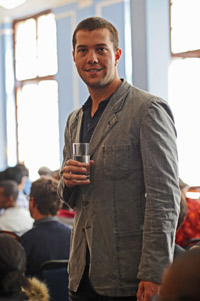Walk the talk in water management, experts say
27 October 2011 | Story by Newsroom Water-wise: Master's student Raymond Siebrits organised a seminar on water research in South Africa.
Water-wise: Master's student Raymond Siebrits organised a seminar on water research in South Africa.
With the water sector faced with some serious difficulties like the steadily dropping storage levels in Cape Town, UCT master's student Raymond Siebrits' seminar on water research challenges came at the right time.
Titled, Water Research Challenges in South Africa, the event was in line with UCT's goal of promoting multi-, inter- and trans-disciplinary research teams, and to connect research to Africa, noted Siebrits, based in Department of Environment and Geographical Science (EGS).
"UCT needs to create a non-faculty aligned integrated water research group that can attract long-term funding, support graduate training and enhance the already world-leading water-related research here" Siebrits explained.
The meeting brought together experts in water-related research from all backgrounds - health, economics, civil engineering, water treatment, conservation, recycling, governance, drainage, wetlands, ecology, you name them.
The aim was to analyse the evolution of water research in South Africa since the establishment of the Water Research Act No 34 of 1971, to look at what is currently being researched, and to determine areas that should be prioritised.
Among the speakers was Professor Denis Hughes, director of the Institute for Water Research at Rhodes University, who noted that South Africa has a long history of supporting water research, has engineering solutions for water and waste-water treatment, and has good policy and legislation in place.
The country, however, still falls short in sustaining data-collection networks, in training and developing human capacity, and lacks monitoring and enforcing compliance with its policies, he said.
"We all know that we have one of the best water policies in the world, but we are not always able to put it to practice," Hughes explained.
With climate change and future developments posing as challenges to water management, Hughes called for strengthened partnerships between research groups, practitioners and decision-makers to make greater progress. Other activities included a presentation by Dr Guy Preston from the Department of Water Affairs, who founded the Working for Water Program and is a graduate of the EGS Department. A panel debate also allowed the 100 plus audience to discuss some critical and often controversial issues around water, research and universities in South Africa.
 This work is licensed under a Creative Commons Attribution-NoDerivatives 4.0 International License.
This work is licensed under a Creative Commons Attribution-NoDerivatives 4.0 International License.
Please view the republishing articles page for more information.










